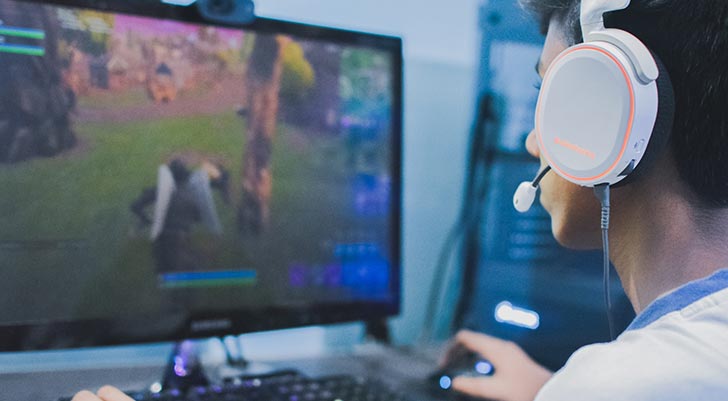
The top 10 tips for avoiding simulation sickness when gaming
If you’re an avid gamer, simulation sickness will come as no surprise to you – but you may still want to learn how to prevent it from happening in the first place.
Or perhaps you’re new to the (literal) game and find yourself wondering how to avoid motion sickness while gaming. Whichever type of gamer you are – expert or novice, we’ve rounded up the best 10 tips so you can avoid feeling any kind of sickness altogether.
What is motion sickness and how does it relate to gaming?
First of all, you might be asking yourself, “what is motion sickness?”. Once you know for sure, then you can establish whether you’ve had it in the past or still experience it now. And you might not know what the exact definition of motion sickness is. Because even if you’ve experienced it yourself, you’re still probably unsure of what this phrase officially means.
Essentially, the term “motion sickness” refers to the nauseous feeling you can get from moving, such as when you’re travelling. And you’ve likely heard of this before, but just in case – it’s also known as travel sickness.
But what are the typical symptoms of motion sickness?
- Nausea
- Sweating
- Disorientation
- Sweating
- Headaches
- Dizziness
If you’ve experienced these symptoms, it may be because you’ve entered a virtual environment, as with gaming. And a pilot who has undergone simulator training could also feel the same, which is why it’s known as ‘simulator sickness’.
Doctors still don’t fully understand the precise reason why gaming causes motion sickness, although they believe it’s a result of conflicting signals being sent to the brain.
For instance, your eyes may detect the speedy motion of the game you’re playing but there are delicate parts of your inner ear that actually identify movement. This then results in your brain telling your body you’re moving when you’re sat completely still. So your brain becomes confused and so does your sense of balance; leading you to potential feelings of motion sickness while gaming.
So, how can I avoid gaming motion sickness?
You might now understand why you get motion sickness while gaming, but how do you avoid it entirely, so you can enjoy gaming to its full extent? We’ve listed 10 of the best anti-simulation sickness tips to ensure you feel good before, during and after you play.
1. Keep the lights on
When you’re gaming, you need to ensure your room is well-lit. You might already be very aware that a dimly lit room can cause headaches because your eyes are having to strain to concentrate. So, ditch the quirky fairy lights or small light-bulb lamp as your main light source and flick on the bigger lights instead.
Bringing good lighting to your room will prevent gaming simulation sickness from occurring in the first place. If you naturally have quite a dark space, invest in a desk or floor lamp to brighten it up. Your eyes will then register that you’re sat in a room and signal this to your brain, rather than being tricked into thinking you’re literally being attacked by the ‘zombies’ you’re fighting.
2. Change your screen’s settings
The screen you’re playing your favourite game on can make a big difference. You’ll need to check your screen’s settings and potentially skew them a little, to improve your overall experience.
If you have very high refresh-rate displays, this can make you feel nauseous. To prevent this sickly feeling, adjust your display to something much slower, or reduce the frames-per-second. Also, look into changing the sensitivity settings on your game; this will really help improve your gaming experience.
3. Take breaks in between gaming
Like anything that involves using your brain, you should be taking regular breaks when you’re gaming. Of course, you don’t want to interrupt a key moment, but when you’re changing levels or you’ve just finished one round of a game, take time to look after yourself.
Just go and get some fresh air by popping outside for ten minutes, go and wash the pots or do anything that doesn’t involve looking at a screen for a short time. Your brain will then feel refreshed and ready to go when you return and take on your gaming rivals. Also, ensure you always have a glass of water to hand to maintain your hydration levels and avoid simulation sickness.
4. Avoid sitting too close to the screen
It may seem obvious to you, but many people sit far too close to their screen when gaming, which can play a big part in causing motion sickness. Simply put, you need to ensure there is enough space between your gaming chair and your screen, so your eyes are not overworked. The brightness settings should also be adjusted to make sure you don’t have a glaring light bouncing off of your gaming screen.
5. Ease yourself in
If you’re using a new game entirely, you must ease yourself into it; this gives your brain and senses time to adjust. To do this, stay active for just five minutes to begin with, and slowly increase your playing/watching time. You’ll then quickly feel comfortable with the movements, settings and pace of the game, without getting a headache or feeling nauseous.
6. Switch your screens
You may well need to change your screen size to prevent simulation sickness from happening frequently.
The screen you’re using for gaming should be neither too big nor too small. Generally speaking, smaller screens are actually better for your health when you’re gaming. This is because your brain is then reminded that you’re sat in a room, and not physically a part of the game on-screen. Smaller screens reduce sensory contradictions from happening, which ensures your motion sickness levels are kept to a minimum – or don’t occur at all.
7. Disable motion blur
When you’re gaming, motion blur is really prominent. Usually, when your move the camera speedily, the vision then blurs to disguise slight graphical flaws and to simulate the blur our eyes naturally interact with. But the level of motion blur involved in some games can be a little too much for your brain to handle, which then results in feelings of motion sickness. So, if you’re suffering from dizziness and nausea when gaming, it will massively help if you disable motion blur, to prevent side effects from happening altogether.
8. Deactivate camera bobbing
Your favourite game could involve camera bobbing – where your character’s head is bobbed up and down to mimic head movement. However, your physical head stays static while this occurs, which confuses your brain and can also make you feel a little wobbly. To avoid this, simply go into your game’s settings and disable the camera bobbing feature; it will make such a difference.
9. Change the game
You may love the game you’re playing, but if it’s making you physically ill all too often, it’s time to switch to another. Remember, one game may give you motion sickness, but each game is entirely different. So, don’t worry; you won’t have to give up gaming altogether.
Although, if you’ve been playing a first-person shooting game and it’s made you feel dizzy, you may need to abandon this type of game. as they typically involve speedy camera movements to slay the bad guys, like your game character spinning around continuously.
10. Speak to your doctor
If you’ve tried all of the above but to no avail, we’d recommend seeking a professional to get some trained advice, and potentially some medication to help stop simulation sickness from occurring. They may suggest using acupressure bands on your wrist to relieve your nausea when gaming, or prescribe you anti-sickness medication.
It may be that motion sickness isn’t occurring at all, but you actually need glasses or need to increase your prescription, in which case, a doctor will refer you to the opticians to seek the best advice.
So, don’t just take a tablet and expect your symptoms to go away, seek professional help instead. The quicker you do, the quicker you’ll be back gaming with your friends.
Discover more from Hyperoptic
Now you know exactly what to do to avoid motion sickness while gaming, you can put these 10 tips into practice.
For more gaming-related pieces, read our article on what is a good ping for gaming, what is cloud gaming or simply peruse our extensive collection of other blogs discussing technology, hyperfast broadband and everything in between.



